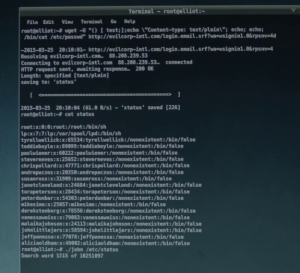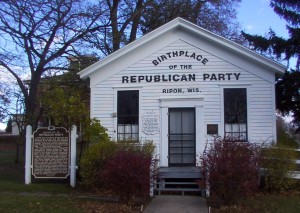On May 5th, I wrote a lengthy piece proposing that we give up on the Republican Party and start a new one. Several people wrote to ask me to post a shorter version of that post. Here it is!
The now-inevitable nomination of Donald Trump is a disaster for conservatism. We knew this. But the disaster is much worse than that.
It is a disaster for conservatism that so many Republicans voted for Trump. Trump is a 2016 fever dream, but those who voted for him will still be around in 2018 and 2020. They are essential to the conservative-Republican coalition… and it turns out they aren’t really conservative at all. Still: the conservative coalition can survive a rebellion. It’s worse than that.
The real disaster for the conservative movement is that the Trump Train only began with a rebellion. It ended in a palace coup. Republican Conservatism could survive one; it can’t survive both.
The Reagan Republican Party Is Dead
The Republican East Coast ruling class always claims we can’t nominate a conservative because of concerns about “electability” and “expanding the map.” Instead, they say we need to “compromise.” Oddly, their “compromises” always take the form of surrender on social issues, from abortion to immigration, while standing fast — no matter the political cost! — on tax cuts for the rich. Hence nominees Dole, McCain, Romney, and, to an extent, both Bushes.
This year, Acela Republicans had to choose to nominate either Sen. Ted Cruz, who is irritating but conservative, or Donald J. Trump, a violent, racist, lying, adulterous thug without a conservative principle in his body, whom the general electorate likes about as much as they like scrotal cancer.
And the Republican Establishment picked Trump.
So: one-third of the Republican party (the populist faction) has enthusiastically rejected conservatism for Trumpism. That’s bad enough. But then another third of the Republican party (the establishment faction), proved that it hates conservatism so much that, if forced to choose, they’d rather have Trumpism.
Trumpism, people! That’s how little the Wall Street Journal Republicans think of Russell Kirk and the National Review! They don’t just hate conservatives more than Hillary; they hate us more than Trump!
The populists and the leadership are together on this one: they are against conservatism. We can’t beat them both. On the contrary, they have roundly beaten us.
For decades, small-government, local-business, pro-life, pro-family, pro-liberty, pro-Western, and pro-local voters, calling themselves “conservatives,” have flocked to the Republican Party. That party is now dead. There is no plausible future in which the Republican Party — always an imperfect ally — ever again serves those causes. It may do so in name; bribing conservatives with show votes and meaningless words in the Platform. The party’s interests may even occasionally align with ours; the plutocrat class would be delighted to cut subsidies for Planned Parenthood, because they view it as a waste of money. But the Party’s commitment to conservatism is not even skin-deep. Fight to protect the rights to conscience and private property and you’ll find yourself alone; threaten un-conservative subsidies to super-corporations like Boeing and God Help You.
The Republican Party is no home to us. It’s possible that it has not been for some time. It surely won’t be again.
So what are we to do? We seem to have no options: the Democratic Party is unacceptable for a number of reasons, and the compromises we’ve made to make the Republican Party serve us seem to be failing, too. Existing third-parties aren’t viable; if they were, they would have broken out to major-party status by now.
In these radical circumstances, we should take a look at the same radical solution embraced by the very first Republicans, 150 years ago: start a new political party.
Taking a Page out of Lincoln’s Book
Every few decades, somebody tries to start a new political party. Most attempts, like Teddy Roosevelt’s in 1912 or Strom Thurmond’s in 1948, fail immediately. Even those that gain a foothold in national politics, like the Greenback Party (1874-1888) usually collapse eventually. But, in 1854, anti-slavery “issues voters” across the North came together to oppose the Kansas-Nebraska Act and, out of this loose coalition, the Republican Party emerged.
Why did the Republicans succeed where others failed? Here are a few reasons:
- Republicans drew sizable numbers of voters from both existing parties. There were plenty of anti-slavery Democrats out there just waiting to be welcomed into a party whose platform they could support. Republicans were predominantly ex-Whigs, but drew enough Democratic support that they were able to build a majority coalition… not just split the Whig vote.
- Republicans started from the grassroots. The Republican Party began in a one-room schoolhouse in Ripon, Wisconsin, where the Whig town committee met with anti-slavery Democrats and Free Soilers and voted to start a new political organization — a local organization dedicated to electing local anti-slavery candidates. Hundreds of towns followed suit, and those organizations only slowly knitted themselves together into a national Republican Party over the course of several years. Great national leaders like Teddy Roosevelt are handy, but local parties are the hands, feet, head, and heart of a new political party. If you don’t have them, you don’t have a party.
- Republicans still needed (and got) support from elites. The Republicans were able to fill their ranks and build local organizations quickly because prominent Whigs defected to the Republicans en masse, at every level, while sympathetic newspapers spread the message and even helped organize Republican political conventions.
- Republicans adopted a narrow platform focused on a couple issues that ALL their voters could agree on. If you’re asking people to abandon their current political affiliation to throw in with a brand new party, you need to be backing policies that they really want, without backing anything that they’re deeply opposed to. For the early Republican Party, the central issues were opposition to the expansion of slavery, support for the rule of law, and support for national infrastructure spending. Their official platform was just a few hundred words long.
- Republicans had strong regional support, but potential to grow beyond it. Nationally, Republicans weren’t very popular; the South hated them and the Northeast was more inclined toward the Know-Nothing Party (which was basically the Trump Party of 1854). But Republicans had strong regional support in the Midwest, where they won many races. This allowed them to gain a foothold in national politics. They later expanded into the Northeast, giving them a majority.
Lessons for Us
I have no interest in building yet another utopian fringe third-party that never wins an election. America has plenty of those, from the Constitution Party on the Right to the Green Party on the Left. There will always be two and only two major parties in America. If our new party can’t disembowel one of the existing major parties and take its place within a dozen years, then there’s no point.
Fortunately, the Republicans of 1854 have given us a blueprint. While it is too late in 2016 for us to make a difference, we can (and should) begin trying to lay the groundwork for a new organization. This will require the support of many local grassroots activists (protesters, local party chairmen, interest groups, and so forth), as well as the support of “elites” — influential opinion columnists, national organizations, and, yes, even Congressmen. The first steps will be the most difficult, because nobody wants to be the first to risk their political necks on a new, unproven party, but, once momentum starts to build, it will keep rolling, and, by 2018, we should have the strength to put up competitive slates in at least ten states, and we should win at least ten seats in Congress. (If that doesn’t happen, then there probably isn’t an appetite for a new party right now.)
We also need to find a couple of core principles that a new party can rally around: principles that can help us build a narrow, targeted platform that attracts both Republicans (especially anti-Trump Republicans) and Democrats (especially anti-Clinton Democrats) in large enough numbers to build a new majority coalition. I am still talking to people about what that might look like, but the two principles I have in mind right now are:
- A commitment to the inherent dignity of the human person: at conception, at birth, in childhood, in college, in poverty, in sickness, in prison, in a refugee camp, in marriage, in the workplace, at church, in parenthood, in our country, in foreign lands, in old age, in natural death. Wherever there are human beings in need, we will support them, and we will protect their lives, their liberty, their property, and their well-being through wise, honest laws and a strong social safety net.
- Broad opposition to the giant, impersonal, inhuman entities that increasingly rule our modern world: Big Business and Big Government. Businesses would be encouraged to get smaller, to de-emphasize stock prices, and to operate at the local level rather than in gigantic, powerful multi-nationals. Meanwhile, government would also move toward the local level, still providing a social safety net, but with each state figuring out their own way of doing it. (If voters in one state want Scandanavia-style single-payer health care, let them do it. If voters in another state want Singapore-style free-market health care, let them do that instead.)
I think a new party constructed along these lines could win a great deal of support, especially in the West and Midwest. Pro-life, pro-family Republicans would back it for its strong support of human dignity, as would many anti-poverty, anti-racism Democrats. Catholic voters, long divided between the two parties over various issues, would find a comfortable home with this platform. Many “Ron Paul Republicans,” highly concentrated in purple-state urban cores like St. Paul and Denver, would swoon for a chance like this. So would a lot of middle-class “Union Democrats.” Mormons fit the party profile perfectly, and there are opportunities for support from African-American voters, who are often socially conservative and economically moderate. All this points to a durable base of regional support in the Midwest and the West, with opportunities to expand into the South and mid-Atlantic.
Off the top of my head, here are four sitting Congressmen who I think could find themselves at home in our party: Sen. Ben Sasse (R-NE), Rep. Paul Ryan (R-WI), Rep. Joe Donnelly (D-IN), Sen. Joe Manchin (D-WV). I also know for a fact there are many more people sympathetic to these principles, in both parties, who are never elected because they are screened out at the primary stage (in both parties) for violating party orthodoxy on abortion (for the Democrats) or the military-industrial complex (for Republicans).
This won’t be a perfect party for anyone — no party is. Big-tent politics means biting your tongue sometimes when your party supports something you don’t. But we live in a Trump vs. Hillary world; many Americans would see this new party as an improvement. Heck, for longtime conservatives, it may be our only hope.
If you broadly agree with what I’ve articulated here, if you’re a Republican suddenly looking for an alternative to Trumpism (or a Democrat looking for an escape from Clintonism), or you’re just interested in where this goes, sign up for email updates. This is a special mailing list I am making just for the new party: you won’t get anything except updates about this party, and that’s assuming it goes anywhere at. You won’t get blog updates or other spam:
The subscription script isn’t working. For now, click this link. I’ll try and get the proper form fixed later.
And if you have any suggestions for the new party’s name, the combox is open! The trick, I’m discovering, is finding a word that hints at what we stand for without alienating anyone. Until we’ve voted on a name officially, I’ll keep calling it the New Party.
I hope you’ll join us on what promises to be a strange ride.





